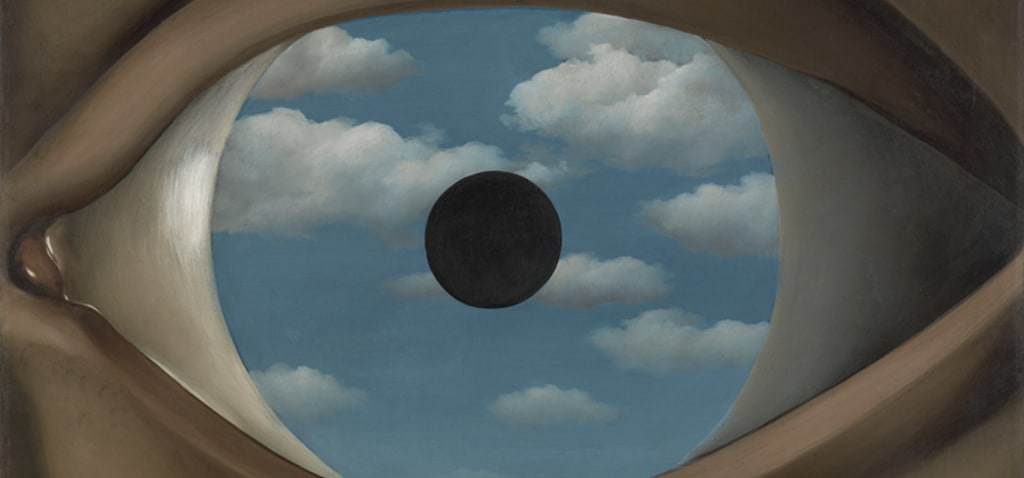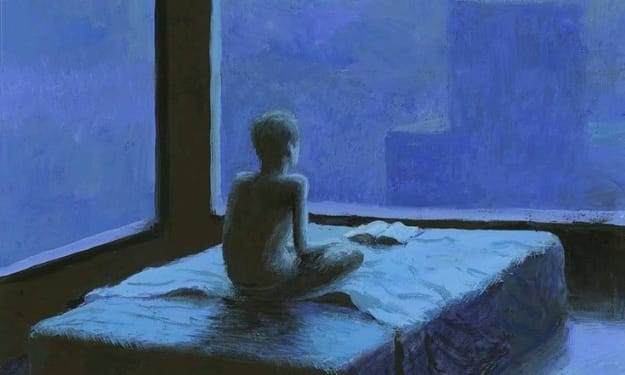Cultural Disengagement
A sense of community woven through a tight-knit culture

Today, I went on a walk to grab some bubble tea and I bumped into a lady who handed me a bible. By now, it should be normal to interact with religious activists, but it got me thinking (a little too much, some might argue) about the state of religion today.
We've never known more about the world until now: with the advancements in science, technology and engineering, we've learned to rationalize our world through fact versus fiction. Coinciding with the rise of science and technology came the gradual fall of religion: religion is no longer the deciding factor in many of the major societal decisions we make anymore. For the majority of history, society had turned to the Church or many highly-respected religious leaders to determine major decisions but now, we instinctively turn to science. We turn to factual evidence, and for the most part, it makes sense. It's revolutionized the world into what we live in today. Although there are still many problems we have yet to overcome, the scientific revolution (beginning with the Age of Enlightenment) has made our world a much easier place to function in. I mean, I just had to click a few buttons and I had my bubble tea waiting for me at the shop. But I’m afraid that a deeper, underlying issue has been brewing underneath all the fun and fast bubble tea, a quiet chaos that grows louder by the day. We all feel it, and many of us try to ignore it, but it's still there. Why is it that, at a time where we’re so connected and know so much about the world, we grow to feel lonelier and more lost than ever?
When Kar Marx claimed that religion was the “opium of the people”, I wonder if he considered the withdrawal symptoms that “the people” would have to go through when science began to dominate faith. For generations, our ancestors relied on religion to guide their existential and spiritual beliefs. In Ronald F. Inglehart’s article Why is Religion Declining?, he references this “psychological vacuum” as a result of the collapse of Communism. After the second world war, ‘the people’ patiently awaited the return of religion, but “An analysis of religious trends [show that] from 1981 to 2007 in 49 countries containing 60% of the world’s population did not find a global resurgence of religion”(Inglehart). It is clear that religion is becoming a tale of the past, and science has quickly taken its position. Those who still have faith in religion are met with a new political battle: science and religion continue to butt heads for dogmatic control over the state, and science is in the lead. Religion is no longer the sole determinant of good and bad, right or wrong, and it is no longer a directing force in societal beliefs. As a result, the majority are allowed to create their own personal belief systems based on the most accessible resource available: the Internet. The beautiful Internet encourages the branching of new and profound ideas, alongside wild conspiracies about who’s in the Illuminati. False or true, information will spread like wildfire. As a result, Gen Z and Millenials have access to enough information to form their own logical beliefs of the world and share them with as many people as they can reach. It’s how we grew up, and it's become the new normal. But the fall of religion is something that older generations are still recovering from. Millennials and Gen Z have brought on innovative ideas that promote inclusivity, acceptance and mental health. These ideas shine a whole new light upon the world; a light that considers all forms of identity, culture and politics. With the help of the Internet, the world is connected on a larger level, allowing anyone and everyone to be heard. This is not a society constrained by the beliefs of heaven or hell. It’s not a society that abides by the strict definition of an omnipotent God. It’s an ever-changing world now, and to quote Mary Shelley: “Nothing is more painful to the human mind as a great and sudden change”.
Great and sudden changes are happening all around us. 2020 was a year saturated with change, and it didn’t end in 2021. Ground-shifting changes cause a certain level of pain, and on a global scale, this could warrant a phenomenon that I refer to as “cultural disengagement”. Cultural disengagement is the phenomenon of actively disengaging with one's own culture, due to a difference in personal belief or just a general disinterest in it all together. The disengagement in one's culture is growing rapidly with the rise in scientific advancement, an increased normalization of philosophical endeavor, social media, and even influencer culture. As we grow to learn more about the world, we also grow to question everything we used to know. Religion has lost its weight in our decision-making process and we're stuck in a place of the unknown, where our only source of direction is from the Internet. When science hasn't yet found all the answers and religion has proven its own faults, where must one turn to?
Culture and community have been tied at the hip for generations, serving as a warm, comforting blanket for our hearts to reside in when life gets too difficult to bear. However, our culture is constantly changing in a way that is extraordinarily new and freeing. There is so much freedom offered to us through technology that many of us may not be sure what to do with it. Whether it be in what we do, what we say or what we choose to believe in, our access to freedom is all at the ends of our fingertips. What else is there to do but explore? We find that many of us discover and switch between different beliefs, identities, behaviors and relationships, searching for something- anything- to ground us in something real and tangible. Yet, we still feel an overwhelming sense of loss and confusion towards the greater meanings of life, purpose, family, relationships and love. When our culture is in constant change, our reality is blurred by all the different ways to conceptualize our world. At this point, the only reasonable remedy that should be considered is community.
A sense of belonging is crucial for human beings, yet many in the first world have never felt this true and ever-lasting feeling of connection. The way our world is built won't allow for it. As you may have heard before, there is no better person to rely on than yourself. The idea of individuality, which pertains to the ideas and goals of the individual, is an idea that's been instilled into my mind for as long as I can remember. One may argue that the nature of the first world is to stress an individualistic culture: it promotes the idea of independence and freedom of choice, and these are beautiful concepts. However, an underlying issue awakes in the midst of this cry for independence and that is the crippling loneliness that many young adults face in today's society.
Nation-wide, the loneliest age group ranges from 16-24. During a time where isolation is necessary, I can imagine this sense of loneliness is at its peak. When we look at history, we see that humans have always lived in close proximity to one another, heavily relying on each other for support, love and connection. It is no surprise that, in the individualistic culture we live in today, these are things we find ourselves desperately craving for. I argue that religion and culture used to be a remedy for the chaotic emotions that define human nature. Through family and communal union, a guideline was provided for one to depend on at times of loneliness and astray, but now that those crucial aspects of living have been sapped dry from our culture, where must one turn to?
When science hasn't begun to hold all the answers to our burning questions, and religion is disproven day after day, our system of beliefs is forced to be reckoned with on an individual basis. When every human being is wrapped up in their own thoughts, ideas and sense of meaning, we're too busy to look up and step into a world of unity. Many of us stand on the outside, watching and waiting for something to happen, something to lead us back to a place where things aren't so lost and uncertain, where true freedom and sanity can be sought out and truly enjoyed. Our choice to culturally disengage and wait for something more convincing is much too lonely a place to be. So many of the things we thought we knew are being disproved every day, so what can we truly believe in?
True engagement in culture and the community is more than just contributing to religious practice and attending community-held events. A true community is there for each other through thick and thin, wholly open to each other with no room for exclusion. It fills one with an irreplaceable sense of connection that carries one through days of the worst pain and the greatest joy. That is reliance, a place where it isn't just you figuring out yourself, what to do with you and how to do it. Instead, it is everyone figuring everything out, together, bringing on a sense of comfort in the pursuit of life. As society promotes ideas of inclusivity, equality and acceptance, we slowly move towards a world that is governed by a strong sense of community. Hopefully, once these changes are ingrained into every corner of the world, we begin to realize that no one is truly alone and that everyone deserves their place in the world. At the end of the day, it may just be the savior we need in these difficult times. Because it fills the hole that would normally feel no filling. It sedates the mind that wanders endlessly for that feeling of connection, stitching up the wounds you thought were irreparable. You're not crazy, lost or unfixable: you're just stuck in a world that's a little lost to its sense of community and direction; lost in things that distract you from the greater, underlying problem. But have hope, because if history has taught us anything, it's that humans have the capacity to become greater and more enlightened. We're hard-wired to seek a fix and I have trust that each and every one of us won't stop until this greater disconnect is resolved. As long as we stay true to our hearts, we can begin to engage in a collective culture that's held us together for so long, and hopefully, look forward to more than just instant bubble tea.
Inglehart , Ronald F. “Why Is Religion Suddenly Declining?” OUPblog, Oxford University Press's Academic Insights for the Thinking World, 7 Dec. 2020, https://blog.oup.com/2020/12/why-is-religion-suddenly-declining/.
About the Creator
Aathavi Thanges
Disposing my thoughts one page at a time
Enjoyed the story? Support the Creator.
Subscribe for free to receive all their stories in your feed. You could also pledge your support or give them a one-off tip, letting them know you appreciate their work.






Comments
There are no comments for this story
Be the first to respond and start the conversation.